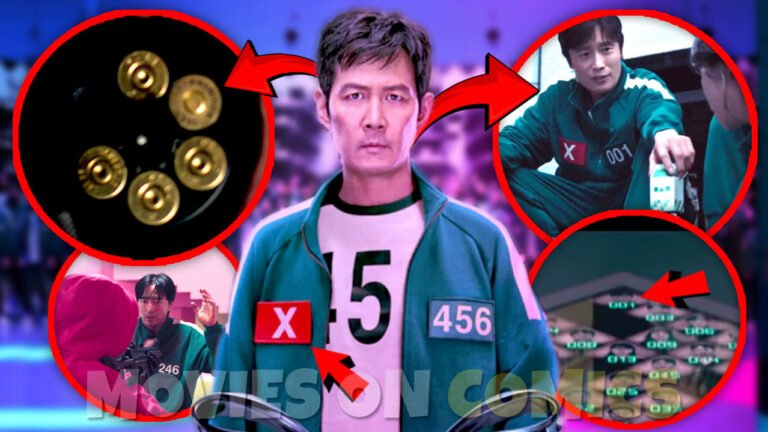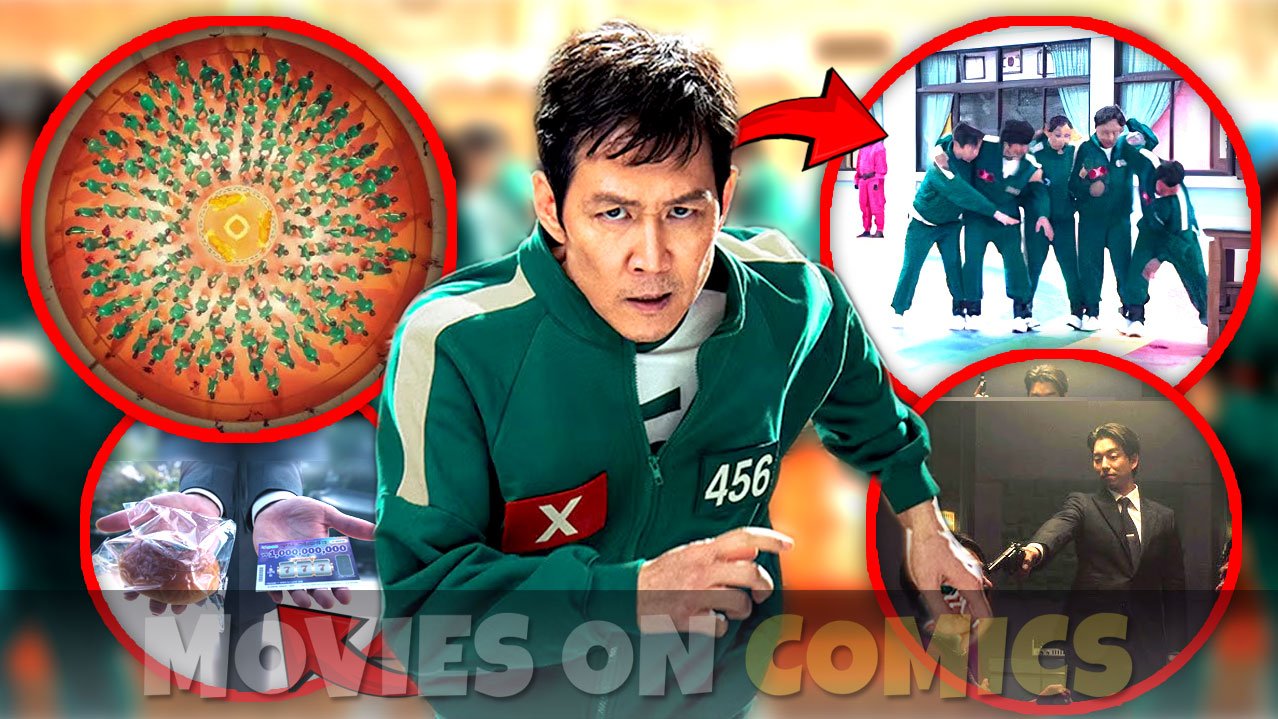
Squid Game Season 2 – All 13 Games In Squid Game 2 Explained
Netflix’s Squid Game gave children’s games an exciting twist, turning them into a thrilling experience. In Season 1, a total of 7 games (6 + 1) were played. However, Season 2 ended on a cliffhanger after just 3 games. But did you notice that a total of 13 games were played in Season 2? So, what exactly are those 13 games?
Season 2 introduces a mix of familiar games from Season 1 and exciting new ones, starting right from the first episode. Let’s begin with Game #1:
Game #1 – Red Light, Green Light

Viewers of Squid Game Season 1 will immediately recognize the iconic game Red Light, Green Light.
The rules are quite simple:
players must move from one side of the map to the other when “Green Light” is announced and music plays. The moment “Red Light” is called, players must freeze completely. Any movement during the “Red Light” phase leads to elimination.
In the world of Squid Game, players who fail to stay still during “Red Light” are eliminated by gunfire.
In Season 1, we learned that the giant doll at the other end of the map has motion detectors in its eyes, which scan players to detect movement. Initially, it seemed like the doll directly controlled the wall-mounted guns, sending them signals to auto-fire.
However, in Season 2, with more details revealed from the workers’ perspective, the process behind this game becomes clearer.
The doll’s motion sensors detect movement and send signals to the staff members in the control room. These staff members monitor the signals on their screens and relay the player numbers to the armed snipers positioned along the walls. Upon receiving instructions, the snipers identify the player and shoot them, ensuring elimination.
The game enforces a strict zero-tolerance policy for movement, no matter how slight. Even minor shaking, accidental movements, or being pushed by other players results in instant elimination. This adds an intense layer of fear and precision to the game.
Game #2 – Six-Legged Pentathlon

Season 2 introduces an exciting and challenging new game: the Six-Legged Pentathlon, which consists of multiple mini-games. This game replaces the Dalgona round as the second challenge of the series. Players are divided into teams of five, and each team assigns one member to participate in a specific mini-game.
Here’s the twist: all five team members are tied together at their legs, forming a “six-legged” unit. They must move as a single entity along a circular path, stopping at each station to complete the mini-games.
Teams are given just five minutes to finish all five mini-games and cross the finish line. Failure to complete the games within the time limit results in the elimination of the entire team — all five members are shot.
The Five Mini-Games:
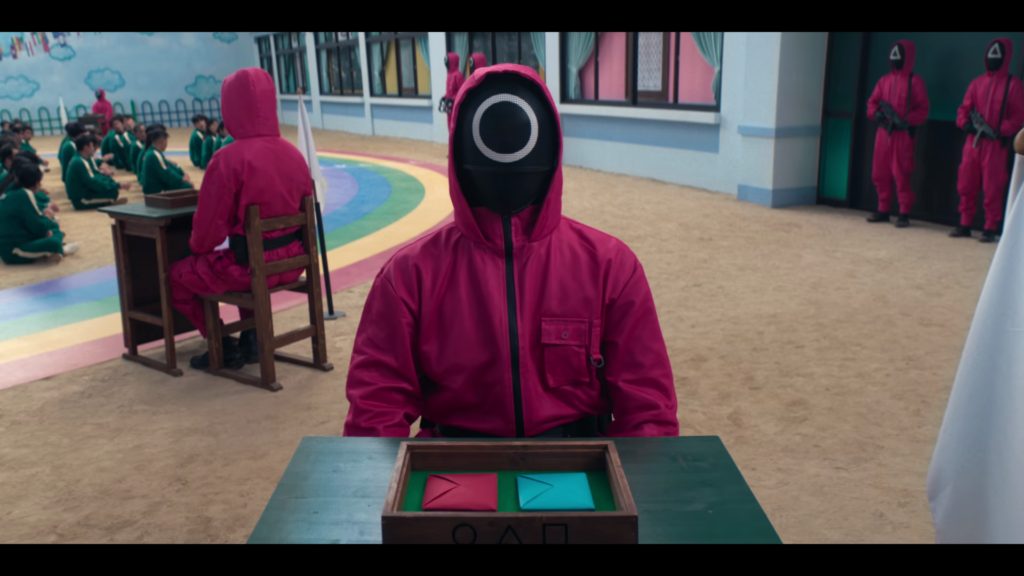

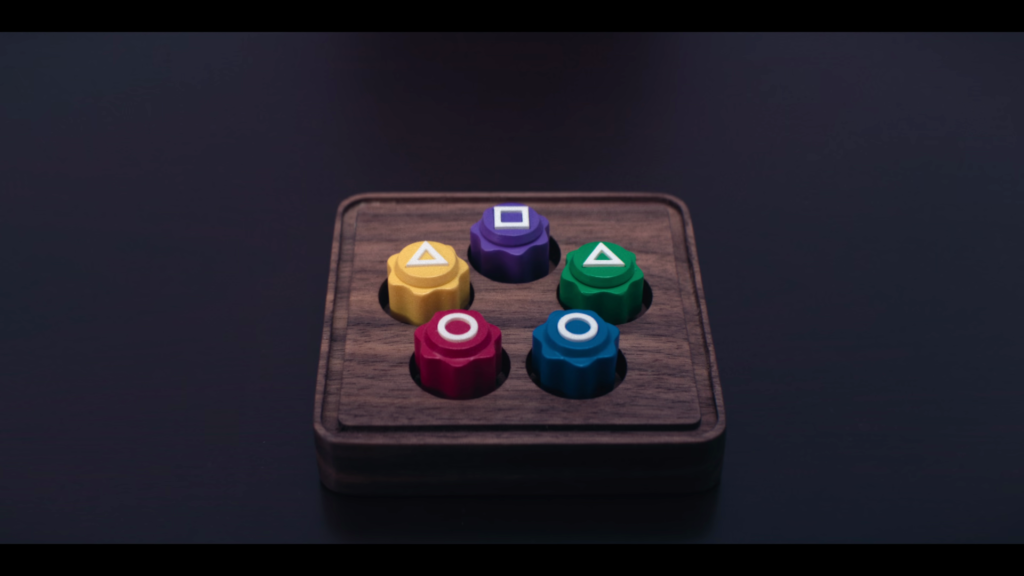
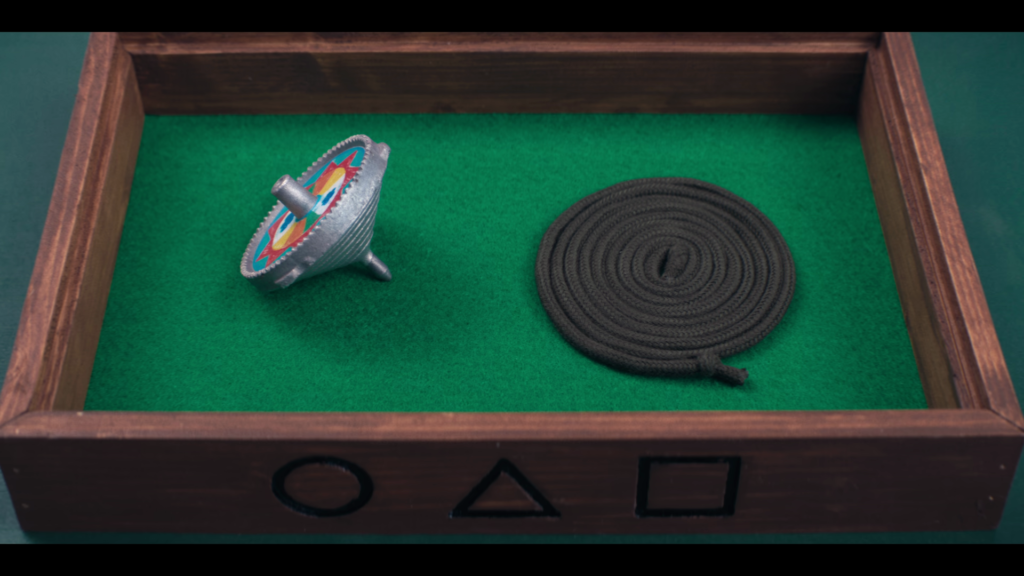
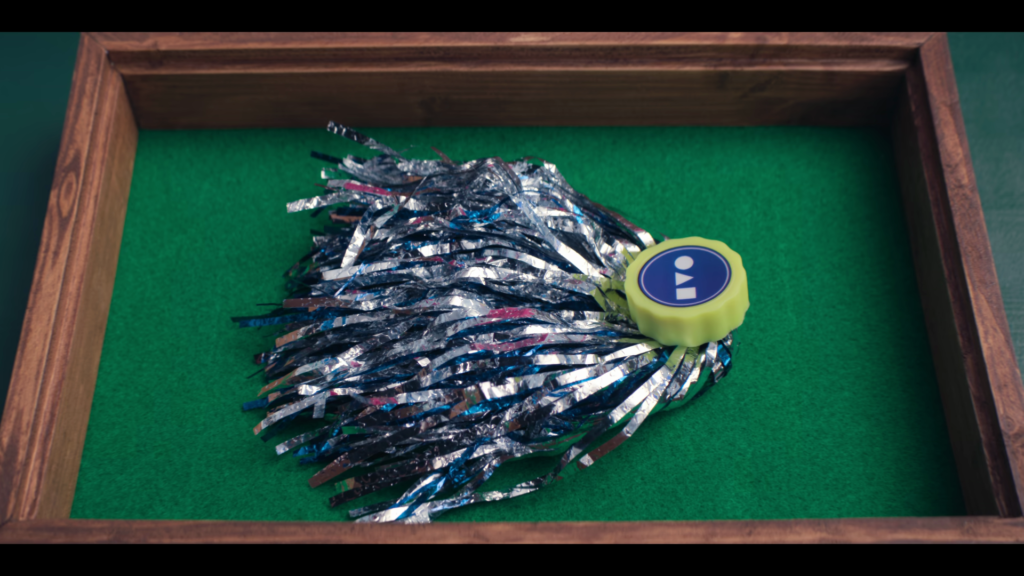
- Game 1 – Ddakji
This is the same envelope-flipping game seen in Season 1 and Season 2, used by the Salesman to recruit players. The rules are simple: hit a folded paper tile with another tile to flip it over. Flipping the tile clears the game, allowing the team to move to the next challenge. - Game 2 – Flying Stone
This game involves knocking down a vertical stack of flat stones from a distance of about 10 feet using another stone. It’s similar to the traditional Indian game Pithoo or Lagori, where players knock over a stone stack with a ball and try to rebuild it while the opposing team tries to tag them.
However, in Squid Game, failure means elimination by gunfire, not a playful ball. - Game 3 – Gong-gi
Known as Korean Jacks, this game uses pebbles or small stones. Players must toss one pebble into the air and quickly pick up the others in a specific sequence: first one, then two, then three, and so on. In the final round, they must land all five stones on the back of their hand and catch them.
Interestingly, this is similar to the traditional Indian game Pacheta. - Game 4 – Spinning Top
The fourth game involves wrapping a string around a metal top (lattoo) and releasing it onto the floor, ensuring it spins successfully. This is another traditional children’s game, popular in India as well, but sadly, it’s now almost forgotten. The player clears the round if the top spins properly. - Game 5 – Jegi
The final game, though it seems easy, is deceptively challenging. Jegi Chagi is a Korean folk game akin to hacky sack, where players kick a jegi (a toy made of a coin and paper) into the air and try to keep it from touching the ground. In Squid Game, players must kick the toy at least five times consecutively without letting it fall.
Additional Challenge: Six-Legged Walking

Even moving from one mini-game to the next is a test in itself. The six-legged walking mechanism adds to the difficulty, as the entire team must stay synchronized.
Combining these 5 mini-games with the six-legged walking challenge brings the total count of games so far to 7.
Game #8 – Mingle
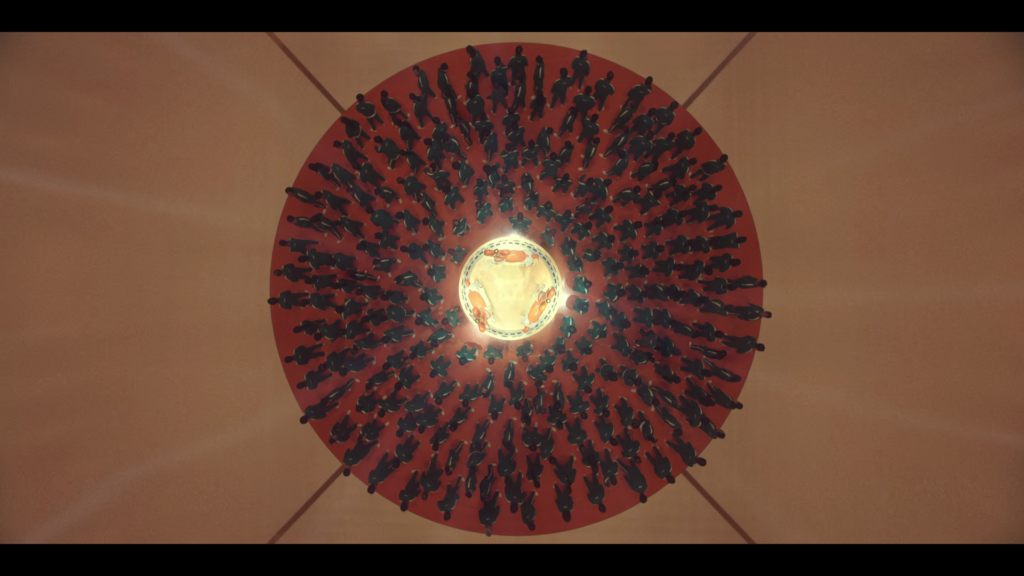
The third official game of Season 2, Mingle, introduces a fresh and thrilling challenge to the series. The rules are deceptively simple but highly intense.
Here’s how it works:
Players gather on a giant, rotating merry-go-round-like platform. As the platform spins, upbeat and exciting music plays. When the platform stops, an intercom announces a random number, and the real challenge begins.
Players must quickly form groups matching the announced number and rush to small rooms located at the edges of the platform. Each group must seal themselves inside the rooms, ensuring the door is closed, all within 30 seconds.
- Players who fail to reach a room in time are immediately eliminated by guards.
- Those in a room with the wrong number of members are also executed, regardless of their efforts.
While the rules seem straightforward, the high-stakes environment transforms Mingle into a nerve-wracking battle of wit and survival. The fast pace and randomness of the game push contestants to make split-second decisions, often resulting in betrayals and broken alliances.
In their desperation to survive, players will:
- Lie, manipulate, and abandon allies—even close friends or family—to ensure they’re in the right group.
- Exploit others’ trust, only to leave them behind when it matters most.
Why Mingle Stands Out:
The unpredictability of the announced number and the limited time to react make this game both chaotic and emotionally draining. It’s not just about speed and strategy but also about outsmarting others in a cutthroat environment.
Mingle is a perfect test of survival instincts, where quick thinking and adaptability are the keys to staying alive. It brilliantly balances psychological intensity with physical urgency, ensuring players and viewers are on edge throughout.
Game #9 – Special Round (Lights Out)

In Squid Game Season 2, the competition halts after the third game due to a revolt led by Gi-hun and some other contestants. However, before the season ends, a “bonus round” called Lights Out unfolds, delivering one of the series’ most intense and gruesome moments.
In Season 1, we saw a similar scenario when a player’s death sparked chaos. Contestants realized that killing each other would not stop the games but instead increase the prize money. Once the lights went out, many players were brutally killed, largely due to the rowdy gangster Deok-su and his followers.
In Season 2, it’s revealed that these night killings are not accidental but deliberately orchestrated. This time, Lights Out is officially acknowledged and announced by the staff as a “special round” to ensure the games’ progression.
The Catalyst for Chaos
In Episode 6, when 100 players split their votes evenly (50-50) on whether to continue or end the games, the decision reaches a stalemate. According to the rules, a re-vote is scheduled for the next day. However, the staff uses this delay to spark unrest among the contestants.
- Contestants are provided forks with their meals, which they are allowed to keep. The management knows exactly how these will be used.
- Tensions escalate in the bathroom as groups start fighting, and forks become deadly weapons.
As Gi-hun anticipates, the real chaos unfolds when the lights are switched off. Some players use the darkness and forks to ambush and eliminate their opponents. While participation in Lights Out is not mandatory, the fight for survival forces almost everyone into the carnage.
This round turns into a mass murder scenario, testing not only players’ physical survival skills but also their ability to navigate trust and alliances in such a dire situation. The absence of official regulations amplifies the unpredictability, as players turn on each other in the pitch-black arena.
Lights Out in Season 2 serves as a chilling reminder of the games’ true nature, where human desperation and fear are weaponized for entertainment. It stands out as one of the series’ most harrowing moments, further emphasizing the psychological and physical horrors of the competition.
Game #10 – Ddakji

Yes, Ddakji makes a dramatic return in Squid Game Season 2, continuing its legacy as the iconic entry point for new contestants. Just like in Season 1, The Salesman uses this traditional South Korean game to test potential players’ desperation and willingness to participate in the life-and-death competition.
What is Ddakji?
Ddakji is a simple yet strategic game played with folded paper tiles, also called ddakji.
- Objective: Use one paper tile to hit another on the ground with enough force or technique to flip it over.
- Rules: Players take turns, and the one who successfully flips the tile wins the round.
Winning: Players who win against The Salesman receive cash rewards, usually enough to excite them.
Losing: Instead of losing money, they receive a hard slap as punishment—inflicting humiliation and pain.
This “low-stakes” game cleverly manipulates players psychologically:
- It preys on their financial desperation by offering cash rewards.
- It normalizes the concept of punishment (the slap), conditioning players to accept physical consequences for failure.
- It subtly tests their decision-making under pressure, a skill critical for survival in the actual games.
In Season 2, Ddakji serves as more than a recruitment tool:
- It’s a symbolic reminder of how easily players are lured into the Squid Game.
- By revisiting this game, the series highlights the recurring cycle of exploitation, desperation, and manipulation that fuels the games.
While Ddakji appears harmless, it acts as the first step in a dark journey, where players unknowingly trade their dignity and freedom for a shot at escaping their financial struggles. This seemingly simple game sets the tone for the horrors to come, making it one of the most memorable elements of the Squid Game series.
Game #11 – Bread and Lottery
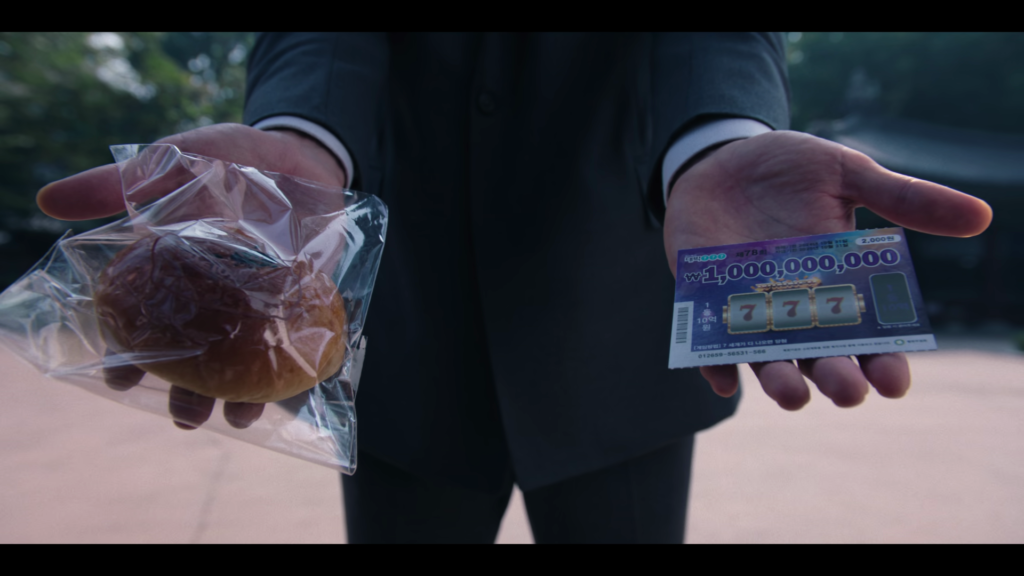
The title of Season 2’s first episode, “Bread and Lottery,” is also the name of this game, marking a powerful and symbolic opening to the season.
In this game, The Salesman introduces a new concept. This time, he purchases 100 loaves of bread and 100 lottery tickets and offers them to random, financially struggling individuals in public—mostly targeting homeless people.
He approaches them and gives them a choice:
- Take a loaf of bread (guaranteed sustenance).
- Or take a scratch lottery ticket (a chance at something bigger).
But they can only choose one.
As expected, most people choose the lottery tickets and immediately scratch them. However, almost all the tickets are worthless, leaving them empty-handed.
The Deeper Meaning
This game carries a profound message. People, especially those struggling financially, are often tempted to take risks for the possibility of a higher reward, even if it means giving up a guaranteed, immediate benefit like food. Desperation clouds their judgment, pushing them to gamble on uncertain outcomes.
This reflects the psychology of gambling. Studies show that individuals with lower incomes are more likely to engage in gambling because hope—a promise of a better future—is marketed as a product. Tragically, this hope often preys on the most vulnerable.
After the game ends, the loaves of bread that were not selected are thrown to the ground by The Salesman. He stomps on them, showing that they were perfectly edible and could have served as sustenance, but now they are worthless. This act is a stark commentary on wasted opportunities and the harsh realities of misplaced hope.
Bread and Lottery is more than just a game—it’s a chilling reflection of societal issues, exposing the cycle of exploitation faced by the underprivileged in the name of hope.
The Salesman’s “Bread and Lottery” game perfectly sets the core theme of Squid Game—the intense struggle between desperation, hope, and risk-taking.
Game #12 – Jokenpô – or Rock, Paper, Scissors – Minus 1
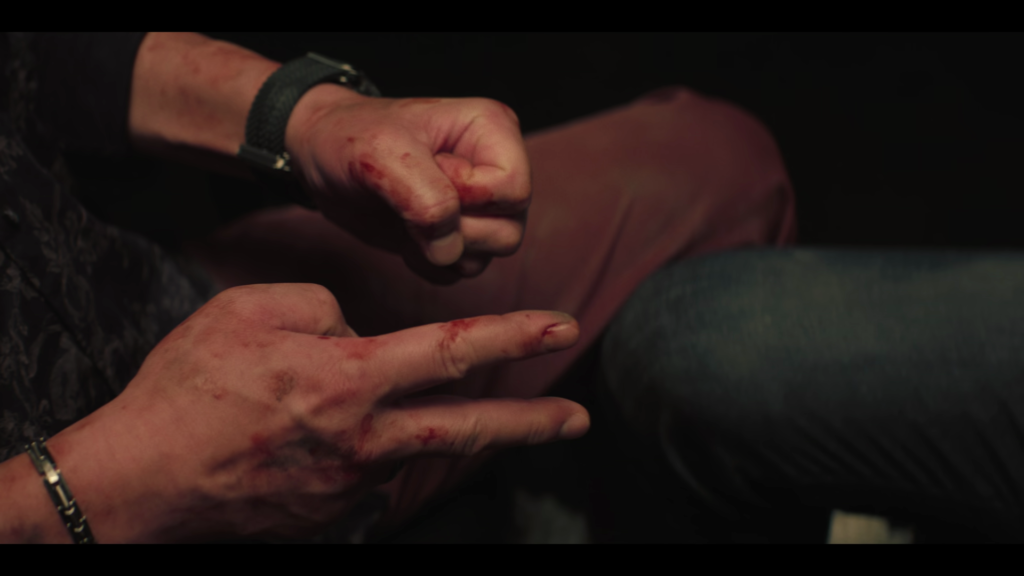
The 12th game in Season 2 occurs in Episode 1, where the Salesman forces Mr. Kim and his assistant Woo-seok to play a game to decide who will survive.
In Korean, Jokenpô (commonly known as Rock, Paper, Scissors) is a simple and widely recognized game. Played between two players, the game requires participants to form one of three hand shapes:
- Rock: A closed fist.
- Scissors: Two fingers extended to resemble scissors.
- Paper: An open hand.
The rules are straightforward:
- Rock crushes Scissors.
- Scissors cuts Paper.
- Paper covers Rock.
Each round results in a win, loss, or draw based on the players’ choices.
The Twist: “Jokenpô Minus One”

The Salesman adds a unique twist to the classic game by introducing “Jokenpô Minus One.”
Here’s how it works:
- Instead of showing one hand, both players extend both hands at the start of each round.
- At the Salesman’s command, “Minus One,” both players must retract one hand of their choice, leaving only one hand in play.
This twist makes the game more intriguing, as players can see their opponent’s initial selection and use it to adjust their choice strategically before retracting a hand.
This version of Rock, Paper, Scissors adds a psychological element, requiring quick thinking, observation, and the ability to anticipate your opponent’s next move. It’s a clever modification that turns a simple game into a tense and high-stakes battle.
Game #13 – Russian Roulette

Russian Roulette is another game that is quite common and well-known.
However, this is the first game in the show that is not a children’s game.
In Season 2, Episode 1, the Salesman plays this game twice:
- First, as part of Jokenpô, with Mr. Kim and Woo-seok.
- Second, with Gi-Hun at the end of Episode 1.
The Rules of Russian Roulette
The rules of Russian Roulette are simple:
- A 6-shot revolver is loaded with only one bullet in one of the six chambers.
- Players take turns pointing the revolver at their heads and pulling the trigger.
- If the bullet fires, the game ends, and the player is eliminated.
Typically, in Russian Roulette, the revolver’s chamber is spun after each shot, keeping the chances of the bullet firing at 1 in 6 after each turn.
But the Salesman modifies the rules:

- The chamber is only spun once at the beginning of the game.
- After the first shot, the chances of the bullet firing increase with each successive turn.
This twist means that the game progresses all the way to the last shot, leaving the players in a tense situation where, at any moment, one of them could decide to shoot the other.
However, in a dramatic and symbolic moment, both Salesman and Gi-Hun, dedicated to the game, take their final shots at themselves, showcasing their commitment and determination until the end.
Which game did you like the most?
Make sure to share your thoughts with me in the comments below! Also, check out this content in video format on my YouTube channel, Superfansyt.




